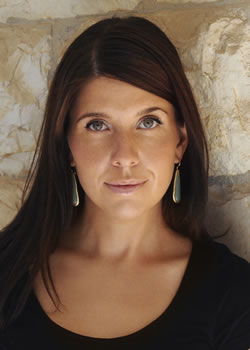|
When I began writing my story collection, The UnAmericans, I was blissfully ignorant of all things publishing-related. I'd never considered the difference between a commercial or independent press, or publishing stories in magazines versus small journals—reading was, at that time in my life, a completely personal and haphazard experience. I'd wander into a bookstore and stumble upon a book, fall in love with it and obsessively read everything by that writer, then read interviews with them to discover which writers they admired and go search for those books, and so on.
It was really important for me to keep my blinders on while writing. Because I went to a writing program, I was around people publishing books. For some reason, the excitement of seeing close friends publish never pushed me to write faster—instead, it just made me want to tune out any writing business-related noise so I could focus entirely on the book I wanted to write, regardless of whether or not anyone would ultimately be interested in publishing it. That was necessary for me, and for many years I wrote into a vacuum. I didn't send my stories out and tried not to think about how the collection would adhere as a whole—I just focused on trying to make each story work on its own.
I often share this quote from Grace Paley with my fiction writing students—don't write what you know; write what you don't know about what you know. I love and believe in that advice—one of the main reasons I write fiction is to try to understand what life might be like for other people. I've always seen writing as a form of method acting—for the eight or twelve or fifteen months that I'm working on a story, I'm constantly thinking about how my narrator would react to whatever messy social or familial situation I'm in, and it's the moment I begin to see the world through their eyes that I know my story's headed in an interesting direction.
But that doesn't always happen, unfortunately—over the years, I've gone down numerous dead ends in my writing, and those were the times when Paley's advice was most difficult to heed. It was really important to me to write a book that spanned generations and continents, the present and the past, with stories narrated by women and men, young and old, American, Israeli and European. But it would be an outright lie to say that I didn't have spells of doubt in which I wondered whether I had the right to write about these historical moments I'd never lived through.
One thing that's always helped to soothe my writerly doubts is the kinship I've felt with the writers I admire most, even though I've never met them. At this point in my life, I've only experienced what it's like to live in the world as someone's daughter (rather than someone's mother), and many of the writers I've felt closest to—Grace Paley, Alice Munro, Edith Pearlman, Natalia Ginzburg—write so intimately and humanely about motherhood. In a sense, I've turned to their stories in the way I might turn to a wise and generous relative for advice. I was halfway through my book when I read an interview with Paley that completely cracked open my collection and propelled me the rest of the way. She was talking about coming of age as a writer after World War II, and how heavy and masculine the fiction of that time had felt to her, that everyone was reading Hemingway. She said that in comparison, her own stories seemed trivial, and she wondered who would be interested in the kitchen table life she was writing about. That interview stunned me. I couldn't believe that Paley had ever doubted herself. That she'd ever worried her stories were small and unimportant, when I consider her to be one of our best and most nuanced political writers, whose kitchen table politics extend so naturally into the bedroom, the neighborhood, the world.
|


